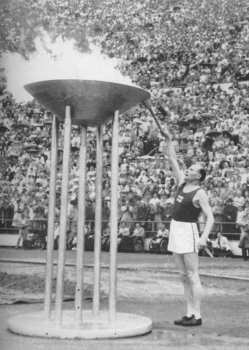Torch and Torch Relay
| Torch Relay 1952
In Greece the Flame was carried the whole way by runners. Stages were 1 km and the average speed 6 minutes per km. There were 342 runners. A member of the Organising Committee, Mr. Lauri Miettinen, arrived in Athens by air from Helsinki on June 20th, bringing with him seven silver torches and 200 fuel canisters. He was present at the kindling of the Olympic Falame in Olympia on the morning of June 25 th and at the evening estival in the marble Stadium in Athens the following day, making a speech in Greek on both occasions. Mr. Miettinen conveyed the Flame by air from Athens to Aalborg in Denmark, attendet by an escort of four Greek athletes. The Flame was kindled in Olympia by the Greek maiden Rea Michalopoulov from the sun's rays with a burning-glass. From the torch thus kindled the Flame was transferred to an asbestos bowl and borne by brown-clad women gymnasts to the festival field. There, at a brief ceremony reverential in character, the speakers were the Prefect of the Province of Elis, the Mayor of Olympia and the Chairman of Greece's Olympic Committee. In accordance with ancient tradition, an olive-branch was proffered to Mr. Miettinen. The ceremony was broadcast in Greece and Finland. The Torch Relay kept well to the time-table. In the dusk of evening the Flame arrived at the Athens Stadium. Searchlights were turned off as the runner bore it to the centre of the arena and kindled the Flame on the altar. |
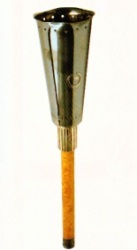
|
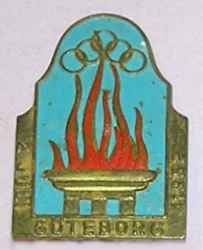
|
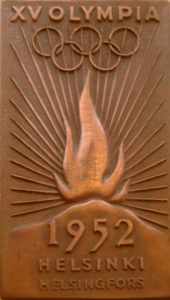
Torch Relay Plaque This copper plaque, on which was embossed the Olympic Flame, measured 40 x 70 mm and was 3 mm thick. The number made was 3 750. Plaques were presented to participants in the Torch Relay as the relay progressed. |
| Country | Date | Distance | Runners | Torches |
|---|---|---|---|---|
| Greece | 25.06. - 26.06.1952 | km | 342 | |
| Air Journey | 27.06.1952 | km | ||
| Denmark | 28.06. - 30.06.1952 | 450 km | 650 | |
| Sweden | 01.07. - 08.07.1952 | km | 700 | |
| Finland | 09.07. - 19.07.1952 | km | 1,350 | |
| Total | 4,725 km | 3,372 | 22 |
June 25th June 26th June 27th June 28th |
Greece Olympia
- Psathopyrgos Denmark Aalborg
- Skanderborg |
July 1st July 2nd July 3rd July 4th July 5th July 6th July 7th July 8th |
Sweden Malmö
- Hälsingborg |
July 6th July 7th July 8th July 9th July 10th July 11th July 12th July 13th July 14th July 15th July 16th July 17th July 18th July 19th |
Finland Departure from Pallastunturi |
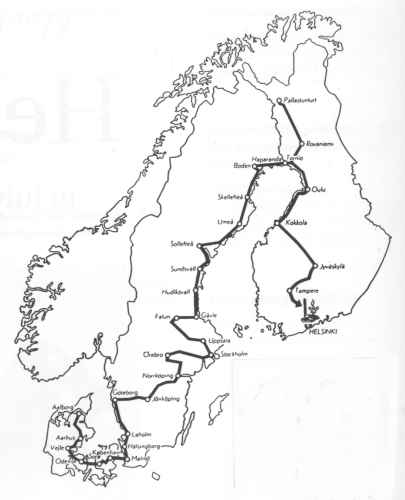
(Source document: Official Report 1952, page 205 - 219)

